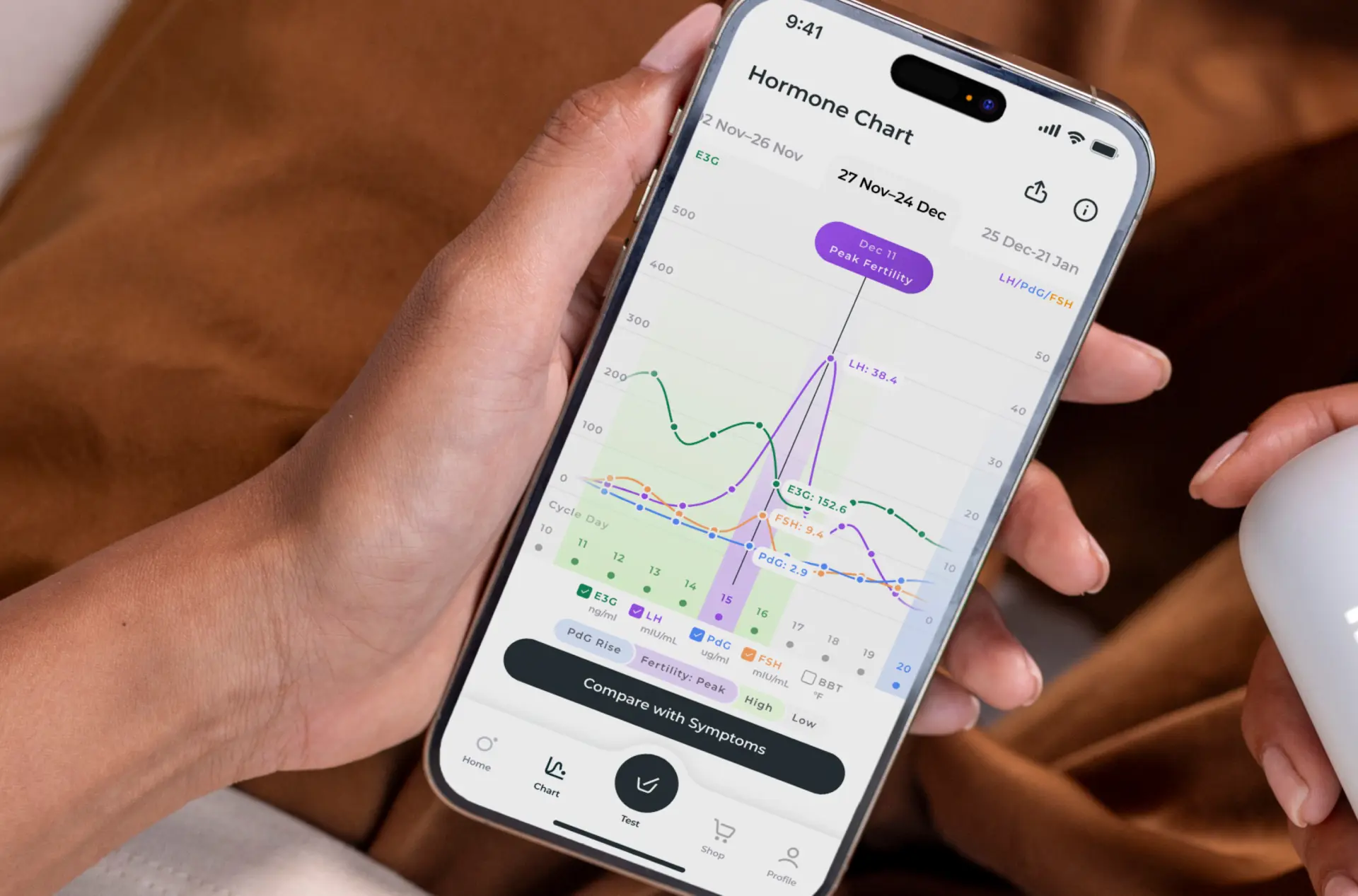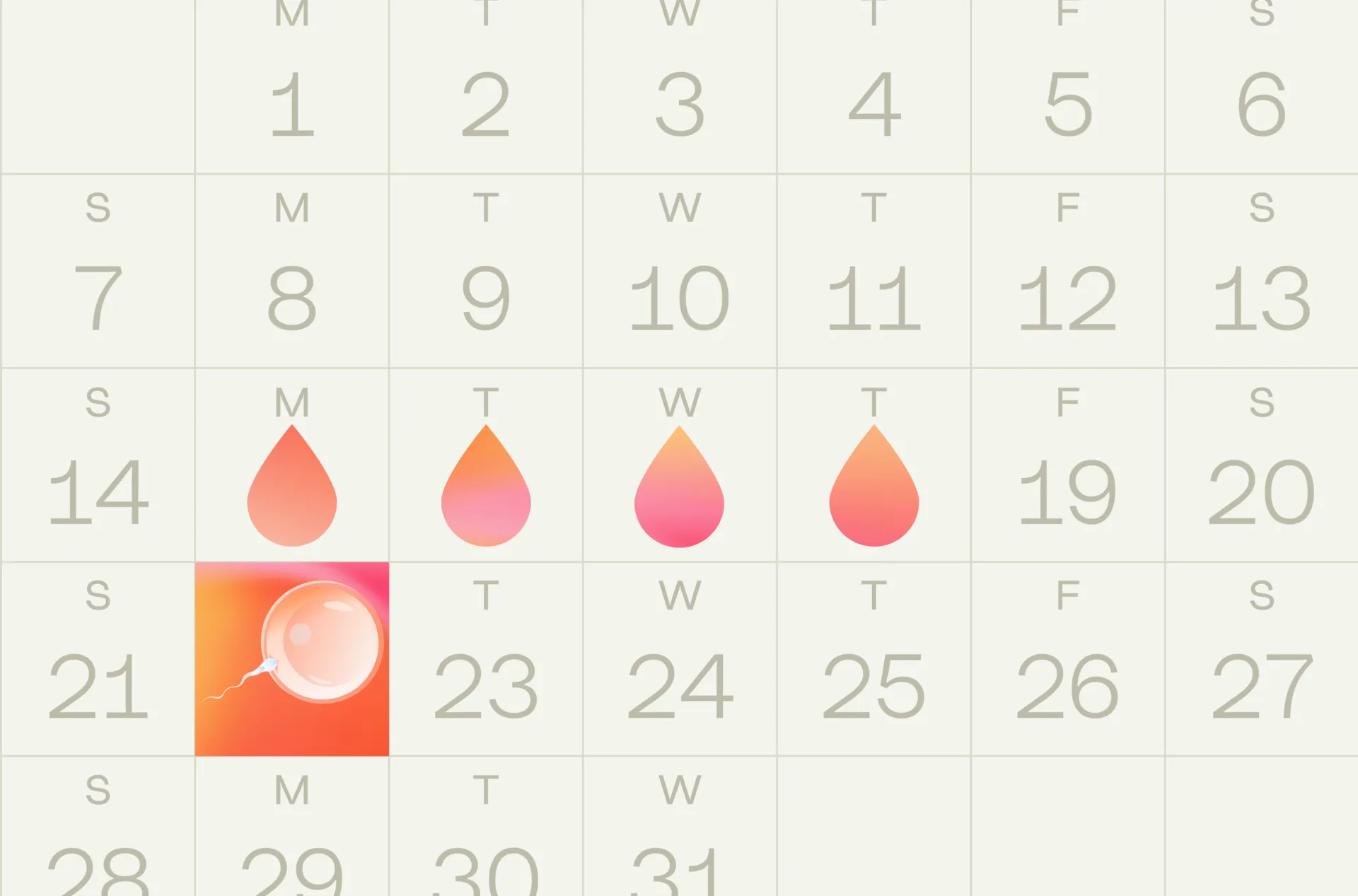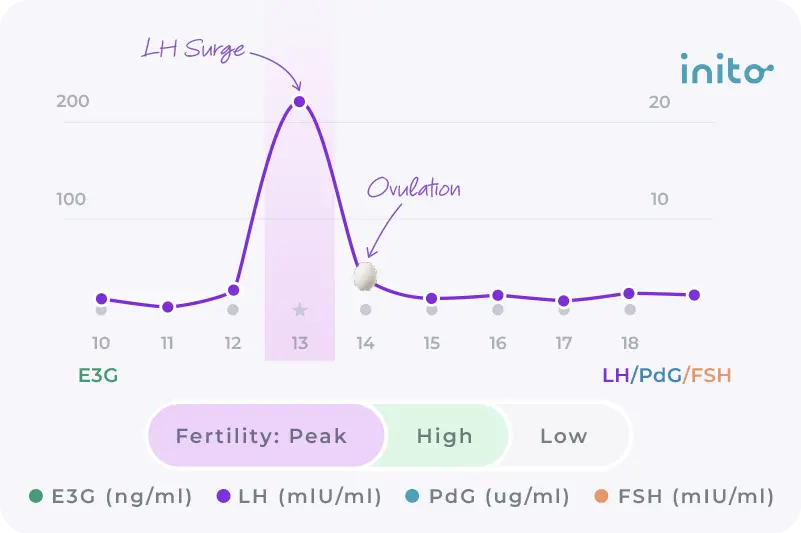Content table
Living with polycystic ovary syndrome and curious about taking supplements for PCOS? And how these supplements will affect your fertility?
Since PCOS is primarily a metabolic condition, simple tweaks to your lifestyle can make a big difference in managing symptoms.
One of these lifestyle tweaks can include incorporating PCOS supplements.
So if you’ve been looking for ways to find relief from PCOS symptoms while also keeping your fertility in mind, keep reading!
Takeaways
- Polycystic ovary syndrome, PCOS, is a metabolic condition with no true known cause. But research commonly cites three factors that may be connected to the root cause of the disease. These are insulin resistance, chronic inflammation, and excess androgens (male sex hormones).
- There are a variety of options available for supplements to take for PCOS symptoms. Some of these include: myo-inositol, vitamin D, CoQ10, curcumin, berberine, and omega-3 fatty acids.
- Myo-inositol can assist with egg maturation, hormonal balance, cholesterol levels, and hyperinsulinemia.
- Vitamin D supports menstrual cycle regularity and having enough mature follicles each month.
- CoQ10 helps with maintaining blood pressure and endothelial function and regulates total testosterone, and blood sugar levels.
- Curcumin supports glycemic control, insulin resistance, LH levels, and ovulation.
- Berberine helps with weight management, insulin sensitivity, and LDL and HDL levels.
- Omega-3 fatty acids help improve insulin resistance and total cholesterol levels.
- PCOS supplements don’t magically cure PCOS symptoms. But they can help improve bodily functions that lead to symptoms.
- Other ways to improve PCOS symptoms include:
- Tracking your menstrual cycles
- Maintaining a healthy weight
- Getting plenty of (but not too much) exercise
- Managing stress
- Consistently getting quality sleep
- Leaning on others for moral support and guidance
How PCOS affects your body?
You may be familiar with the outward signs of polycystic ovarian syndrome like acne, hair growth, and irregular periods. But let’s briefly review how polycystic ovary syndrome alters your physiology in the first place.
The three big “players” thought to be involved in instigating PCOS are:
- heightened levels of androgens
- insulin resistance
- chronic low-grade inflammation
Researchers have yet to pinpoint the exact interconnectedness of each of these conditions in “causing” polycystic ovary syndrome. But all three of them seem to consistently appear in those with polycystic ovary syndrome.
Case in point, studies show that up to 70% of women with PCOS also have insulin resistance.
Here’s a closer look at what happens internally for women with PCOS:
- Insulin resistance leads to disruptions in the liver’s production of sex hormone-binding globulin (SHBG).
- Lower levels of SHBG cause larger amounts of free testosterone to accumulate in the body.
- Higher free testosterone levels lead to further increased androgens (male sex hormones). This basically creates a never-ending cycle of hormonal imbalances.
- These hormonal imbalances cause a slew of issues. These range from inflammation to trouble with ovulating and general fertility challenges.
There is hope in spite of this hormonal chaos though!
Certain PCOS supplements and lifestyle adjustments can help with improving these PCOS instigators.
So next we’ll review what some of the best PCOS supplements are so you can be informed about all of your options.
What supplements help with PCOS?
There are many options for PCOS supplementation nowadays. This includes supplementing with individual nutrients as well as complementary drug therapies.
Disclaimer: Always consult your doctor before starting any supplements.
Look at the chart below to get a glimpse at six common PCOS supplements (and their typical dosing).
PCOS supplement | Common recommended dosing |
Myo-inositol | 1 – 2 grams per day |
Vitamin D | 60,000 IU/week |
CoQ10 | |
Curcumin | |
Berberine | 500 mcg/day |
Omega 3 fatty acids | 900-4000 mg/day |
Keep in mind that these supplements don’t cure PCOS. Instead, they have a positive influence on the factors thought to be part of the root cause of PCOS. (Remember, these are: insulin resistance, inflammation, and increased androgens.)
In this way, these PCOS supplements have the potential to help improve overall health outcomes.
Also, it’s important to note that the dosing recommendations listed above are derived from typical dosages outlined in current research. This is merely meant to give you an idea of what to expect with each supplement.
But again, consult with your doctor before taking any of the PCOS supplements listed here. They can recommend medications and dosing based on your unique health status.
Curious to know more about each particular supplement and how it can help with PCOS?
Keep reading for more details on each supplement below.
Myo-inositol
Myo-inositol is more commonly known as vitamin B8. (Since it’s formed from glucose though, it’s not truly a vitamin.)
It’s a molecule found naturally in bodily tissues that are connected to gonadotropin and insulin signaling. (This signaling is crucial to the maturation process of ovarian follicles.)
Studies show that myo-inositol-only therapy has beneficial health outcomes for women with PCOS. But it’s also effective when paired with DCI (D-chiro-inositol) therapy.
Supplementing with myo-inositol can help those with polycystic ovary syndrome by improving:
- Oocyte maturation (the process of a maturing egg inside of an ovarian follicle. In PCOS, the process of oocyte maturation is often impaired, which can lead to ovulatory issues.)
- Pregnancy rate
- Hormonal balance (for hormones like LH, FSH, testosterone, androstenedione)
- Insulinemia (higher-than-average levels of insulin in the blood)
- Cholesterol levels (specifically, high-density lipoprotein (HDL) aka the “good cholesterol”)
Typical recommended dosing for myo-inositol supplementation: 1 – 2 grams per day
Vitamin D
Science has yet to reveal exactly why vitamin D is so crucial to fertility and reproduction.
What we do know is that it’s involved in the regulation of certain genes. These include genes that play a role in the function of the ovaries, endometrium, and the placenta. As well as genes having to do with the metabolism of glucose and lipids, and blood pressure regulation.
But research shows many women who have PCOS seem to have insufficient vitamin D.
So there could be a potential connection between vitamin D deficiency and the development of PCOS. In fact, one study examined vitamin D levels in women with PCOS who had fertility challenges. They found that 70.3% were vitamin D deficient and 20.3 % had insufficient vitamin D levels.
(Deficient means your body doesn’t have enough to function optimally. Insufficient means the levels are lower than average but not deficient.)
Another study of women with both PCOS and deficient vitamin D levels found several reduced fertility outcomes. These included lower chances of live birth, pregnancy, and ovulation.
Thankfully, some studies have shown promising reproductive outcomes when supplementing with vitamin D.
Supplementing with vitamin D may help those with polycystic ovary syndrome by improving:
- The number of dominant follicles ready for ovulation each month
- The overall regularity of a woman’s menstrual cycle
Typical recommended dosing for vitamin D supplementation: 60,000 IU/week
CoQ10
Like myo-inositol, coenzyme Q10 (CoQ10) exists naturally in your body. It’s a biomolecule that helps create energy within cells.
It’s also known for its antioxidant effect, helping to ward off cell damage from oxidative stress. (Oxidative stress leads to cell damage or even cell death.)
Supplementing with CoQ10 may help those with polycystic ovary syndrome by improving:
- Insulin resistance
- Blood pressure
- Endothelial function (connected to vascular and cardiovascular health)
- Fasting blood sugar (FBS) and insulin levels
- Total testosterone levels
Typical recommended dosing for CoQ10 supplementation: 100-300 mg/day
Know more: Everything You’ve Been Wondering About CoQ10 for Fertility
Curcumin
Curcumin is the major active compound found in turmeric (which comes from the root of a plant native to Asia).
Supplementing with curcumin may help women with PCOS by improving:
- Glycemic control and the metabolism of lipids
- LH levels and ovulation
- Insulin resistance and body weight regulation
Typical recommended dosing for curcumin supplementation: 80 to 1500 mg/day
Berberine
Similar to curcumin, berberine is a compound found in plants. It’s been used for ages in traditional Chinese medicine to treat a variety of ailments. But current research is catching up and revealing berberine’s positive influence on certain PCOS symptoms.
Supplementing with berberine may help women with polycystic ovary syndrome by improving:
- Insulin and glucose levels
- Levels of LDL (low-density lipoproteins) and HDL (high-density lipoproteins). These are commonly known as “bad” cholesterol and “good” cholesterol respectively.
- Insulin sensitivity and blood sugar levels
- Weight management (by helping redistribute fatty tissue and regulating fat storage)
Typical recommended dosing for berberine supplementation: 500 mcg/day
Omega-3 fatty acids
Omega-3 fatty acids are popular for their anti-inflammatory and antioxidant effects. They are also known to help regulate high blood pressure and the abnormal expression of certain genes related to PCOS.
Supplementing with omega-3 fatty acids may help those with polycystic ovary syndrome by improving:
- Insulin resistance
- Total cholesterol (specifically reducing LDL and triglycerides)
Typical recommended dosing for omega-3 fatty acids supplementation: 900-4000 mg/day
The supplements discussed above may help with PCOS symptoms and fertility outcomes. But you have other options too!
Supplementation is only one way to improve your chances of conceiving. There are other factors that should be taken into consideration as well. We’ll go over what these are next.
How else can you boost your fertility with PCOS?
1. Manage your weight and BMI
If you’re medically overweight, talk to your doctor about ways you can improve your BMI. This could include altering your diet or changing up your exercise habits. Reducing your body weight by 5-10% could help with balancing your hormones.
If you’re considered medically underweight, try increasing your caloric intake. Of course, you’ll want to ensure this is done in a nutritionally-savvy way. So consult with your doctor or a nutritionist for an individualized plan of action.
2. Get adequate physical activity
A good target for daily exercise is about 30-60 minutes. Moderately strenuous exercise is best. This is because over-exercising (vigorous activity for more than an hour a day) could increase your risk of anovulation. This is when you aren’t ovulating regularly or at all.
Know more: Anovulation: Everything you need to know about the #1 cause of infertility
3. Keep your stress levels in check
High levels of stress can increase your body’s cortisol levels (the “fight or flight’ hormone). Being in this mode for too long can lead to many adverse health outcomes, including fertility challenges.
So experiment with practices that help you manage your stress and anxiety. This includes things like yoga, deep breathing, meditation, or EFT/tapping.
4. Catch those zzz’s
Your sleep habits play a major role in overall health and hormonal balance:
Here are some ways that sleep impacts you:
- Quality, uninterrupted sleep: 20% improvement in FSH
- Consistent sleep schedule: 60% improvement in estrogen balance
- For each hour slept (during your usual sleep window): Progesterone levels increase by 9.4%
5. Track your menstrual cycles
It’s common for women with PCOS to have trouble with irregular cycles and anovulation. This can make tracking ovulation and trying to conceive a bit trickier.
But the Inito fertility monitor can be really helpful for women with PCOS. It gives you accurate numerical values for the 4 key fertility hormones. These are: LH, estrogen, PdG (urine metabolite of progesterone), and FSH.
It tells you when you’re most fertile and gives you confirmation of when you ovulate (by capturing when your PdG rises). This data will give you a clearer picture of your hormone levels and ovulation patterns. And sharing these results with your healthcare provider could help inform your treatment plan.
Know more: Get Pregnant with PCOS: Your Complete Guide
6. Seek out moral support
You don’t have to struggle through your PCOS challenges or fertility journey alone. Having PCOS or suffering any sort of fertility obstacles can be overwhelming. But you are not alone! There are tons of folks experiencing similar circumstances as you across the globe.
So find people who can commiserate with you as well as lift you up. You can consider joining a support group like Inito’s TTC Facebook community. The members of this supportive group share the realities of their fertility journey with each other.

FAQs
Making adjustments to your diet can help with a variety of PCOS symptoms. Some staples of the “PCOS diet” include: lean protein, lots of fiber, and unsaturated fatty acids.
Learn more: Your Guide to the PCOS Diet: What is the PCOS Diet?
Myo-inositol can help with improving PCOS hormonal imbalances. When hormonal rations are restored, you may experience less fatigue. Vitamin D can also help with menstrual cycle regulation, which may decrease excess tiredness.
This is definitely something to consider and discuss with your doctor! Some research shows that many women with PCOS have lower amounts of magnesium than healthy women.
And magnesium has been proven to help with symptoms like improved sleep, skin, and reduced inflammation.
Myo-inositol can help with regulating insulin and glucose levels. (These are both important factors related to maintaining healthy weight). And berberine is another supplement that is often prescribed for weight management in patients with polycystic ovary syndrome.
Was this article helpful?
- Role of Metformin in Polycystic Ovary Syndrome (PCOS)-Related Infertility – PMC
- The Role of Polycystic Ovary Syndrome in Reproductive and Metabolic Health: Overview and Approaches for Treatment
- Comparative efficacy of oral insulin sensitizers metformin, thiazolidinediones, inositol, and berberine in improving endocrine and metabolic profiles in women with PCOS: a network meta-analysis
- Prevalence of vitamin D deficiency in infertile women with polycystic ovarian syndrome and its association with metabolic syndrome – A prospective observational study – European Journal of Obstetrics and Gynecology and Reproductive Biology
- Vitamin D Deficiency Is Associated With Poor Ovarian Stimulation Outcome in PCOS but Not Unexplained Infertility | The Journal of Clinical Endocrinology & Metabolism | Oxford Academic
- Vitamin D deficiency and female infertility: A mechanism review examining the role of vitamin D in ovulatory dysfunction as a symptom of polycystic ovary syndrome – ScienceDirect
- Hormonal and Metabolic Effects of Coenzyme Q10 and/or Vitamin E in Patients With Polycystic Ovary Syndrome
- Coenzyme Q10 – StatPearls – NCBI Bookshelf
- Effects of Curcumin on Glycemic Control and Lipid Profile in Polycystic Ovary Syndrome: Systematic Review with Meta-Analysis and Trial Sequential Analysis
- Dietary supplements for polycystic ovary syndrome – PMC
- Therapeutic effect and safety of curcumin in women with PCOS: A systematic review and meta-analysis – PMC
- https://eje.bioscientifica.com/view/journals/eje/166/1/99.xml
- Polycystic ovary syndrome management: a review of the possible amazing role of berberine – PMC
- Metformin and berberine, two versatile drugs in treatment of common metabolic diseases – PMC
- Effectiveness of Omega-3 fatty acid for polycystic ovary syndrome: a systematic review and meta-analysis – PMC
- Effect of Exercise on Ovulation: A Systematic Review | Sports Medicine
- Insulinemia – Science Direct












